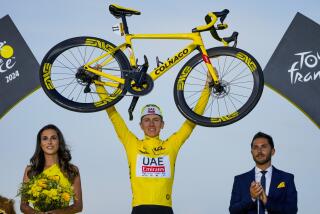Lance’s Last Ride
- Share via
SOMETIME BETWEEN 9 a.m. and 10 a.m. Pacific time Sunday, one of the greatest careers in the history of sport will come to an end. Lance Armstrong, who has already won the Tour de France six consecutive times, will finish the race in the usual way, with a victory that is as inevitable as the 2000 Lakers.
But at least as impressive as Armstrong’s athletic achievement -- he has won the Tour, arguably the most grueling sporting event in the world, more than anyone in history -- is his well-known but not shopworn personal story. In an era when an athlete’s “triumph over adversity” can seem about as genuine as his product endorsements (and more often than not accompanies them), Armstrong’s is epic.
By now it is about as familiar as one of those yellow “Livestrong” wristbands: Diagnosed with cancer in October 1996, Armstrong was given even odds for survival. The chemotherapy worked, and he made a full recovery; two years later, he returned to cycling. But it was not until 1999, when he won his first Tour de France, that his return became triumphant.
Before long, his celebrity transcended his sport. Americans who wouldn’t know a peloton if it ran them over knew Lance Armstrong, as much from his work raising awareness of cancer (those wristbands are a fundraising tool for his research foundation) as from his record as a cyclist. Sure, they knew he won some kind of bike race through France every summer, but their appreciation for the Tour de France went not much further. When he retires Sunday, American interest in it is expected to go with him.
Which is a shame because the Tour is one of the more subtle and rewarding spectacles in sport. There is the setting: an entire country, from the coast to the mountains, through towns large and small, with verdant fields in between. There are rewards and traditions famous and obscure; besides the yellow jersey for the overall leader, the race awards a red polka-dot jersey (for the best climber in the mountains), a green one (for the fastest sprinter) and a white jersey (for the best rider under 25). And there is the combination of competition and chivalry; even as they are merciless to one another on mountain climbs, riders will wait for a competitor who has fallen.
Armstrong, for his part, has been a remarkable champion, especially this year, when he has ridden through the last week of the Tour with relative ease -- as if there were no chain on his bike, he told reporters. His career has weathered not just the cancer but allegations of performance-enhancing drug use that are unfortunately routine for any elite cyclist. (He has never failed a drug test.)
Through it all he has maintained his peculiar mixture of grace and arrogance. Early in this year’s Tour, for instance, he got into a public spat with race officials when he refused to wear the yellow jersey because the previous leader had been forced to withdraw after a crash. He meant it as a gesture of respect, yet it came across as self-important.
But perhaps the greatest measure of Armstrong’s popularity, and proof that sport can still sometimes trump nationalism, will come Sunday morning. The French, who disdained him as a brash American early in his career but now see him as a cycling legend, will cheer Armstrong -- an American, zut alors! -- as (barring mishap) he rides to victory down the Champs-Elysees. And then Armstrong will don the yellow jersey for the last time, accept the small stuffed lion traditionally given to the winner, and thank the crowd. In French, of course.
More to Read
Go beyond the scoreboard
Get the latest on L.A.'s teams in the daily Sports Report newsletter.
You may occasionally receive promotional content from the Los Angeles Times.










